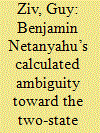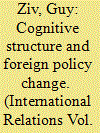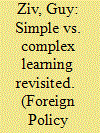| Srl | Item |
| 1 |
ID:
167955


|
|
|
|
|
| Summary/Abstract |
GUY ZIV analyzes the case of Israeli Prime Minister Benjamin Netanyahu’s endorsement of the two-state solution to the Israeli-Palestinian conflict. He argues that Netanyahu’s June 2009 declaration was a tactical maneuver rather than a reassessment of his beliefs.
|
|
|
|
|
|
|
|
|
|
|
|
|
|
|
|
| 2 |
ID:
110845


|
|
|
|
|
| Publication |
2011.
|
| Summary/Abstract |
Rationalist explanations of foreign policy change are underdetermined because they overlook the decision-makers themselves. Insight from cognitive psychology shows that individuals' cognitive structures provide a useful lens through which to understand why some people are more likely than others to change their core beliefs. Two related cognitive variables - cognitive openness and cognitive complexity - hold promise for enhancing extant explanations of foreign policy change. This article assesses the cognitive structure of the three leaders who dominated Israeli decision-making in the decade leading up to Israel's dramatic policy change vis-à-vis the PLO in 1993: Yitzhak Shamir, Yitzhak Rabin and Shimon Peres. The article demonstrates that Peres, who is found to be the most cognitively open and complex, was quicker to embrace a dialogue with the PLO than Rabin, while Shamir, who is found to hold the lowest levels of openness and complexity, rejected this move altogether. Peres, and to a lesser extent Rabin, proved to be more sensitive to international, regional and domestic changes than Shamir. This case illustrates that systemic-structural and domestic political factors are necessary, but insufficient, conditions for foreign policy change. The levels of decision-makers' cognitive openness and complexity are key to determining the likelihood that they will change their beliefs on a core policy issue that can, in turn, lead to foreign policy change. This article thus contributes to our understanding of both foreign policy change and the process leading up to the historic 1993 agreement between Israel and the PLO.
|
|
|
|
|
|
|
|
|
|
|
|
|
|
|
|
| 3 |
ID:
165756


|
|
|
|
|
| Summary/Abstract |
A clear majority of Israel’s retired high-ranking military and intelligence officials support the establishment of a separate Palestinian state.
|
|
|
|
|
|
|
|
|
|
|
|
|
|
|
|
| 4 |
ID:
169369


|
|
|
|
|
| Summary/Abstract |
This article argues that the widespread notion that Israel lacks a Palestinian negotiating partner has endured in Israeli society despite the security community's unease with this narrative. Many of Israel's former generals and spymasters, some of whom were interviewed for this article, have argued that the "no partner" mantra runs counter to Israeli interests and that there are steps the government of Benjamin Netanyahu has avoided taking that would keep prospects for a two-state solution alive.
|
|
|
|
|
|
|
|
|
|
|
|
|
|
|
|
| 5 |
ID:
120980


|
|
|
|
|
| Publication |
2013.
|
| Summary/Abstract |
When does a decision-maker's shift on a major policy issue represent a genuine reassessment in his or her beliefs as opposed to tactical maneuvering? This article provides a framework to improve our confidence that a policy shift represents "complex learning," which entails the adoption of new goals, rather than "simple learning," which refers to a change in means but not goals. Challenging the conventional wisdom on learning, it argues that decision makers who alter their foreign policies incrementally are more likely to have had a fundamental rethinking of their underlying assumptions on a core issue than those who exhibit sudden shifts in their foreign policy decisions absent a traumatic event. The public declarations of Israel's three most recent premiers-Ariel Sharon, Ehud Olmert, and Benjamin Netanyahu-in support of the establishment of a Palestinian state are used to illustrate the utility of this framework. Whereas Sharon and Olmert underwent complex learning, Netanyahu's swift change appears to represent merely a tactical response to pressure from the United States.
|
|
|
|
|
|
|
|
|
|
|
|
|
|
|
|